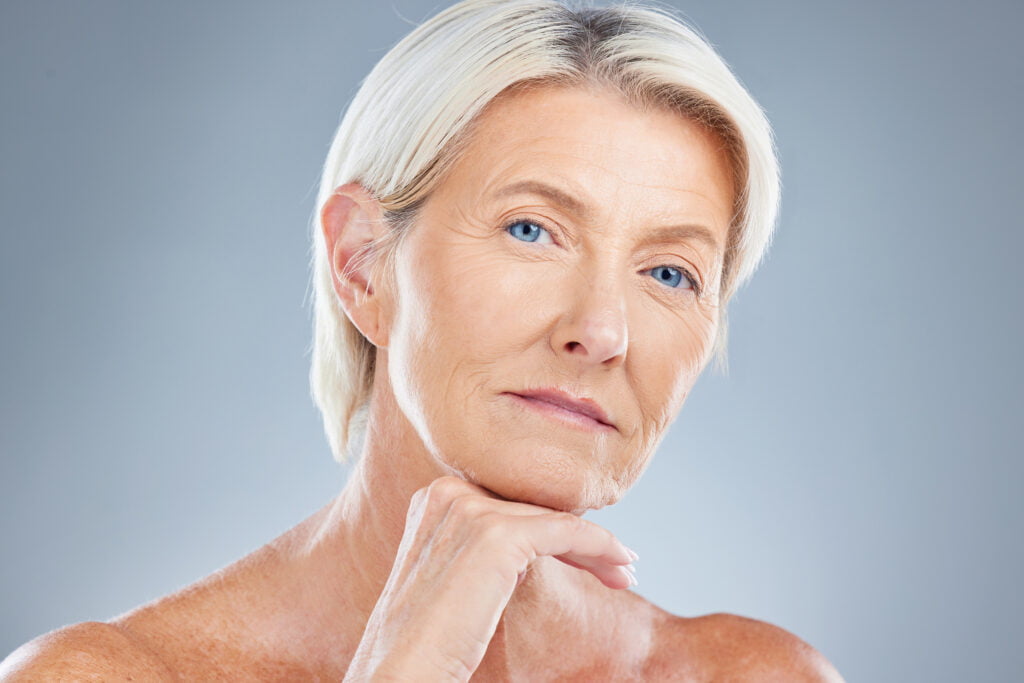There are several changes in aging skin to be aware of, and here are some steps to mitigate their impact.
Skincare and Aging
As people get older, their skin goes through a lot of changes. It becomes thinner as the layer of fat just below the surface begins to break down. Dry skin may develop, that feels almost paper-like. Cuts and other wounds may take longer to heal. Diagnoses like kidney diseases or Diabetes can affect skin health, as well as certain medications. Older adults may also experience sunspots or skin tags. They must pay close attention to signs of skin conditions such as cancer, eczema, or other complex diagnoses. Luckily, there are many approaches to take when addressing aging skin.
What Routines Promote Healthy Skin?
There are many things older adults can do to protect their skin. Staying hydrated by drinking plenty of fluids or eating foods with high water content will help your skin retain moisture. Also, using a humidifier in the home can help reduce skin dryness.
It is important to use soaps and lotions that are gentle on the skin and free from fragrances or harsh chemicals. To ensure that no scents are added, buy fragrance-free products. Seniors should take warm, not hot, baths or showers and reduce both the duration and frequency of bathing. Usually, a five to ten-minute warm bath or shower every few days is sufficient. Skincare routines to cleanse the face and neck can help aging skin stay healthy.
A soft cloth is best for the skin, and older adults should avoid harsh loofahs or poufs when lathering their skin in the bath or shower. Applying lotion right after bathing can help keep the skin from drying out. Aging skin is more sensitive and might require different skincare products.
Wearing protective gloves while cleaning, gardening or washing dishes will promote healthy skin. Also, protective clothing can shield skin from the sun and wind. Hats, sunglasses, and SPF apparel are all great choices in addition to applying sunscreen to exposed areas. It is important to reapply sunscreen during extended outdoor events and to avoid the sunlight during the strongest emissions of Ultraviolet radiation, between 10 am and 4 pm in most areas.
Individuals can also keep fingernails and toenails well-trimmed to prevent causing cuts or scrapes on fragile skin. Also, avoid accessories that may puncture or irritate the skin, such as certain jewelry, fabrics, or fasteners.
These are all fairly simple steps to follow for better skin health. Enlist the help of a family member, friend, caregiver, or medical professional to identify more ways to improve your skincare. You may need to swap out products, find alternatives, or stop using certain items to protect aging skin.

What are the Warning Signs to Seek Medical Care?
Sometimes, despite taking all the proper precautions, intervention from a medical professional may be necessary. Dermatologists are knowledgeable about certain skin conditions seniors are more likely to experience. Skin cancers, like melanoma and carcinomas, or eczema, including stasis dermatitis, are examples of more serious conditions. These always require a more involved assessment.
Some warning signs to look for may include:
- asymmetrical growths with irregular borders
- areas with color changes
- a mole or mark with a diameter larger than that of a pencil eraser
- a part of the skin that seems to be evolving or changing.
- wounds that will not heal
- pressure wounds, also known as bed sores
- presence of varicose veins
- lack of blood flow, redness, or itching
Other infections may also need to be looked at by a doctor or specialist. The above are indications that an older patient should seek care from a specially trained medical professional.
Checking all areas of the skin regularly is the best way to prevent any conditions that might develop into a serious condition. Taking the proper precautions and being proactive about skincare will help increase the quality of living with age. Working together with healthcare providers is essential to maintaining or improving skincare routines.
Skincare: Prevention is the Best Medicine
The Age Well System contains a wealth of ingredients to improve your skin health.
- 1000 mg of CoQ10, which has been shown to reduce wrinkles and help protect skin cells from free radicals. By adding this to your supplement regimen, your skin will not only look smoother but also be protected from age-related skin conditions.
- 1500 mg of Glucosamine and 150 mg of chondroitin pair up to provide connective tissue support. This includes helping with skin hydration and supporting collagen production.
- 150 mg of Turmeric, an anti-inflammatory herb. It has been proven to have protective benefits against many skin maladies, from acne to cancer.
- 25 mg of Quercitin, which is also known to help reduce the effects of Ultraviolet light exposure.
- 25 mg Methionine, which also protects DNA from damage and reduces the effects of aging.
- 25 mg of Bromelain, known to slow down cell death and interfere with the proliferation of cancer cells.
- 25 mg of MSM (Methylsulfonylmethane), a compound that has also been found to improve the quality of the skin.
- 200 mg Boswellia extract, a substance that can reduce skin redness and inflammation.

Skincare Simplified
While some aspects of our health seem out of our control, taking care to focus on what we can control often leads to more favorable outcomes. It is completely unavoidable that our skin will change as we age. Whether wrinkles, sun spots, skin tags, or a papery feeling present themselves. However, we can always educate ourselves on the best practices for caring for our aging skin. Always consult with a medical professional with any concerns. Be proactive by taking supplements such as the ones contained in The Age Well System.
It is important to select supplements that are high quality and sourced from reputable vendors. The Bu Renewed Collection is produced using the purest ingredients. The supplements are manufactured in the United States using GMP (Good Manufacturing Practices) certified by the Food and Drug Administration. Thousands of research studies back these supplements to help you achieve your desired results.






